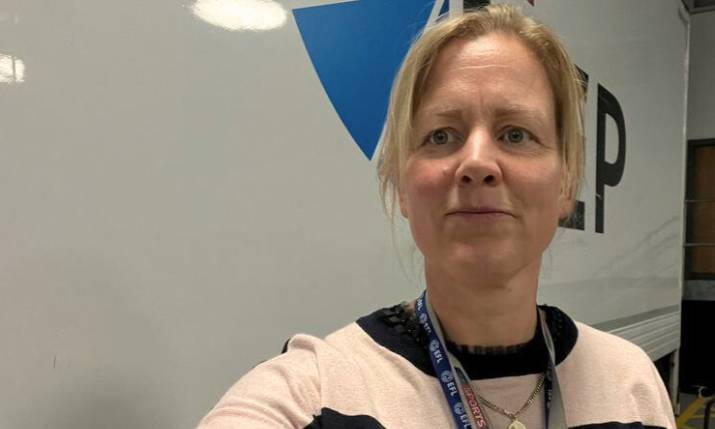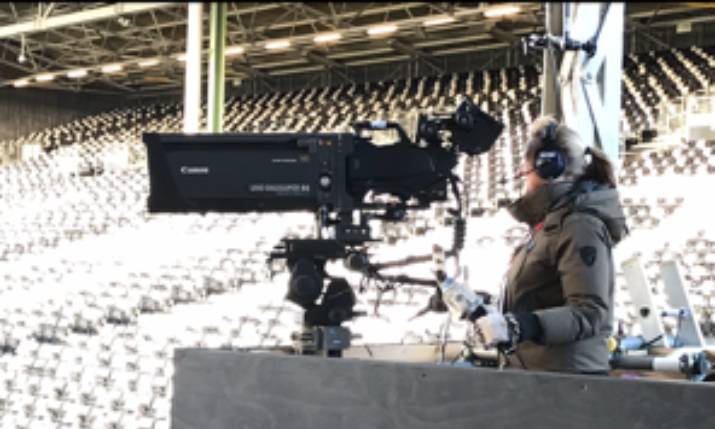Stepping Stones: Unit manager at NEP UK Floor Wouters on challenging the old boys club with tenacity and endurance

Floor Wouters, a unit manager at NEP UK, outside an OB truck at the Brentford versus Everton English Football League game in September 2023
Floor Wouters is a unit manager at NEP UK. Her career has taken her from social work in inner-city London to sports broadcasting OBs, and she has witnessed a lot along the way. We take a look at how she is progressing while challenging bullying and sexism. Wouters’ story is part of our series of Stepping Stones articles, which showcase young women moving up the ladder behind the camera.
After finishing my A-Levels in the Netherlands, I enrolled into a social work course and finished my degree three years later. I subsequently worked as a youth worker for few years before moving to London in 2002; this was meant as a gap year, but I’m still here!
After a few months working in a pub, I took a job within child protective services, and subsequently worked for over seven years within several inner-city London boroughs, working within the under belly of society. The subsequent disturbing and traumatic events I witnessed resulted in a burnout.
I wanted to move on and looked at options to work and learn within cinematography or photography, which were a long-standing passion of mine. I subsequently found the hidden world of live broadcasting through a friend who was a vision engineer.
He offered me a chance to shadow the camera operators and assistants on a job. A week later I was hired as a camera assistant, and a few years after that became a junior operator, followed up by a senior operator and supervisor.

NEP UK’s Floor Wouters has worked on many big sporting events including the Olympics, Asian games, World Athletics, Wimbledon, and Champions League finals
Finding the bigger picture
After working on many big sporting events like the Olympics, Asian games, World Athletics, Wimbledon, Champions League finals, and contractual work on Sky football, car racing and ATP tennis tour I felt motivated and had the urge to work on the bigger picture.
This meant I wanted to move from not just working in the camera department, but all the departments that together make a successful, well put together product. I wanted to see the bigger picture so I could understand what I could improve on and contribute to this process.
In September 2022 I took a staff job as a trainee unit manager at NEP UK and I am currently functioning as the unit manager within the Sky football contract team.
It was and it still is hard work to learn all the elements of broadcasting and to put that in a chewable and more overseeable picture for your crew and your client.
I thoroughly enjoy my job, there is so much more growing and learning to do, which is an exciting prospect.
Wouters’ take on what employers can do to help keep women working in broadcasting:
- Make provision for women to walk back to their car late at night in dodgy areas
- Ensure female toilets are easily accessible (nothing is more inconvenient than when you are on your period and have to use the men’s loo)
- Endeavour to have at least two females working onsite; Wouters noticed that it makes a big difference when she was not the only woman on a job. She says: “I always felt supported when another female was on the crew”
- Create a platform for women and everyone else to report bullying anonymously. Wouters says: “Because most people within OBs are freelance, they feel they might lose out on jobs if they try to address issues. I’ve not been booked on what was a regular job in the past because I tried to address the high level of sexism. This made me hesitate to address issues again. This fear is our reality!!!”
Sexism in sports broadcasting
I was born in the 70’s and grew up in a different culture. This has had an influence on what I regarded as normal within a work environment, and how I experienced sexism within the industry. I didn’t and I wasn’t aware of sexism in sports broadcasting until I stepped out of my last role where I was camera assistant, operator and supervisor. I realised – after feeling safe – how uncomfortable and threatened I have felt in the past and what the impact of sexism had on my career progression.
It had been huge. With jobs for the boys regarded as the norm, women were seen as a form of entertainment at work rather than a valued crew member. We were open targets for someone’s fantasy, with bullying taking place because you’re the only female on the crew… the list is endless.
Luckily, I was born with a good amount of tenacity and endurance, and a, “I just don’t give up attitude”. It is heartwarming to see initiatives to entice more women to join broadcasting, open conversations that are held around sexism, and the acknowledgment of hire management to actively create a good work atmosphere for everyone, which has helped tremendously.
I believe more can be done to keep women working within broadcasting once they start by providing continuity in a stable, good working environment. This is needed to continue attracting women to sports broadcasting, and also other minorities to live sport broadcasting working environments.
Talking it through
I find it difficult to give advice on how to address challenges within someone’s career working within live sports broadcasting. What might work for one doesn’t work for the other.
However, talking through stuff seems to universally work well, and also being in contact with people that face similar issues helps.
In my experience, speaking out to people who can make changes on the work floor has helped in the past, but also resulted in leaving certain live sport broadcasting events.
I think if we keep taking the initiative to attract more women, while simultaneously addressing bullying and sexism in the workplace and make it an open subject to talk about, it is not an unthinkable idea that a larger female representation within live sports broadcasting is here to stay.

